人教版新目标2018年七年级英语下册Unit12Whatdidyoudolastweekend基础知识梳理习题课件(安徽)
人教版新目标英语七下unit 12教学设计
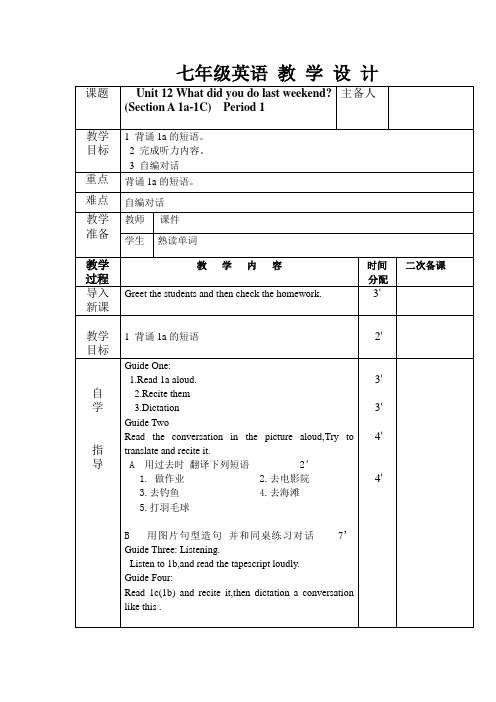
教学
目标
1背诵1a的短语。
2.完成听力内容。
3.自编对话。
2'
自
学
指
导
Guide One:
背1a的短语。完成1b
Guide Two
Finish Listening 1c check the answers
Guide Three:
Make a conversation with a parter like 1d and 1e
3'
教学
目标
1阅读完成对语篇的大意理解
2通过自主阅读,找出语篇中的疑难点,并通过小组合作向老师寻求帮助等多种学习方式解决问题。
2'
自
学
指
导
Guide One:
Read the passage aloud after the tape.
Translate the passage to the students
D.Where did your brother go last Sunday
15'
总结
作业
Summary.
Guide Ss to summarize what they’ve learnt
Homework
1.背诵1a的短语。Finish the.exercises.
3'
板
书
设
计
Drills:
What did you do last weekend?
A.didn’t do B.not did
C.doesn’t D.didn’t
2.My brotherhis homework yesterday morning.
人教新目标七年级英语下册教案 Unit 12 What did you

教学设计自主学习(课前预习)(一)预习指导:学生通过以下方式进行预习:利用人机对话、磁带、光碟、网络、拼读法等听懂、读会单词、单词和句子;通过以往的旧知识或借助同步教材全解,预习领会新的单词、短语及句子等用法)1.复习单词和短语:认真复习Unit 12单词表中P68-69页的单词和短语以及上一节短语和句子.完成一项就在后面√1)认真反复听(3遍)________ ;2)认真反复跟读(3遍)________;3)请根据中文意义默写出对应的英文单词:作为,当做__________, 游客,访问者_______________, 疲倦的,疲劳的_________停留,待_________, 离开,远离__________, 老鼠___________(________)幼小的,婴儿_____________, 呼叫,喊叫____________,语言_____________自然的______________,★蝴蝶_____________,4)请根据中文意义默写出对应的英文词组:深夜不睡______________, 跑开_______________, 冲……大喊_______________2.短语:短语的预习方式和单词的预习方式大致相同,先在书上找到每个短语出现的具体位置,尝试着准确地拼读好每个短语中的每个单词,再把每个短语整体反复读,不会的再在人机对话或其它听力设备中去听读、跟读,直到会读会写为止。
完成一项就在后面√1) 在书上找到以下短语出现的位置,用红笔等自己喜欢的颜色的笔勾画出来________2)认真反复听以下短语(3遍)________ ;3)认真反复跟读以下短语(3遍)________;预习此处的短语:1.work as a guide, ★2.at the Natural History Museum, ★3.a butterfly house,★4.with over 200 kinds of butterflies, 5.living habits, 6.kind of tired,7.a good weekend,8.watch the soccer game, 9.sound fun, 10.play with my father,11.have so much fun, 12.go to the beach with my parents, 13.a family of mice,14.be afraid, 15.climb onto sth., 16.learn a second language4)请尝试把下列短语的英语和中文意思, 正确配对(不会的,翻书或同步教材全解找答案,用红笔订正出来,还有不会的,认真听同学或老师评讲;打★的为拓展的短语,选作,鼓励同学们通过预习,猜测词义或查阅相关资料,其中不认识的单词一定要查阅词典,注上音标):________( ) 1. go to the beach with my parents, A.当导游( ) 2. learn a second language B.在自然历史博物馆( ) 3. climb onto sth C. 蝴蝶馆( ) 4. a family of mice D.有超过200种蝴蝶( ) 5. be afraid E.生活习惯( ) 6. have so much fun F.有点累( ) 7. play with my father G.一个愉快的周末( ) 8. sound fun H.看足球比赛( ) 9. watch the soccer game I.听起来很有趣( ) 10. a good weekend J.和我父亲一起玩( ) 11. kind of tired K.玩得如此高兴( ) 12. living habits L.和父母一起去海滩( ) ★13. with over 200 kinds of butterflies M.老鼠一家( ) ★14. a butterfly house N.害怕( ) ★15. at the Natural History Museum O.爬上某物( )16. work as a guide P.学另一种语言3.句子和对话: 请认真P68,2d的对话,P69,“Grammar Focus”的句子, 尤其听读下面的重点句子,了解其汉语意思,并尝试着将汉语和英语配对。
2018春七年级英语下册 Unit 12 What did you do last weekend

2018春七年级英语下册 Unit 12 What did you do last weekend Section A(Grammar Focus-3c)教案(人教新目标版)一. 教材分析本节课是七年级英语下册Unit 12 What did you do last weekend Section A (Grammar Focus-3c)的教学。
本节课主要围绕一般过去时展开,让学生学会使用一般过去时来描述自己和他人的过去行为。
通过本节课的学习,学生能够听懂、会说、会写一般过去时的句子,并能够运用一般过去时进行日常交流。
二. 学情分析七年级的学生已经掌握了基本的英语语法知识,对一般现在时有一定的了解。
但是,对于一般过去时的概念和使用还不够清晰。
因此,在教学过程中,需要引导学生理解一般过去时的含义,并通过大量的练习来巩固知识点。
三. 教学目标1.知识目标:学生能够掌握一般过去时的构成和用法,能够正确运用一般过去时描述自己和他人的过去行为。
2.能力目标:学生能够听懂、会说、会写一般过去时的句子,能够在日常生活中运用一般过去时进行交流。
3.情感目标:通过本节课的学习,学生能够培养对英语学习的兴趣,提高自信心。
四. 教学重难点1.教学重点:一般过去时的构成和用法,一般过去时的句子结构。
2.教学难点:一般过去时的句子结构的运用,动词过去式的变化规律。
五. 教学方法1.任务型教学法:通过设计各种任务,让学生在完成任务的过程中运用所学知识,提高学生的实际运用能力。
2.情境教学法:创设各种情境,让学生在真实的情境中感受、理解一般过去时的用法。
3.互动式教学法:鼓励学生积极参与课堂活动,引导学生主动发现、探究问题,提高学生的思维能力。
六. 教学准备1.教学课件:制作课件,展示本节课的主要内容,帮助学生直观地理解一般过去时的用法。
2.练习题:准备一些练习题,用于巩固本节课的知识点。
3.教学素材:准备一些与本节课主题相关的素材,如图片、视频等,用于创设情境。
新目标版英语七年级下册 Unit12Whatdidyo Udolastweekend?同步练习及答案
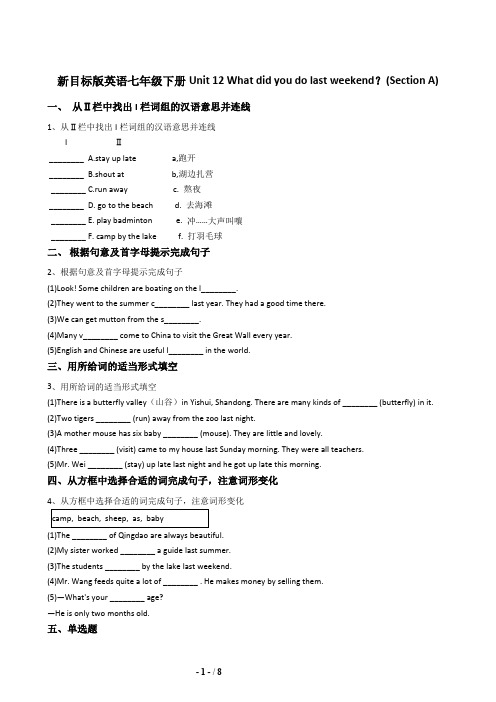
新目标版英语七年级下册Unit 12 What did you do last weekend?(Section A)一、从Ⅱ栏中找出I栏词组的汉语意思并连线1、从Ⅱ栏中找出I栏词组的汉语意思并连线I Ⅱ________ A.stay up late a,跑开________ B.shout at b,湖边扎营________ C.run away c. 熬夜________ D. go to the beach d. 去海滩________ E. play badminton e. 冲……大声叫嚷________ F. camp by the lake f. 打羽毛球二、根据句意及首字母提示完成句子2、根据句意及首字母提示完成句子(1)Look! Some children are boating on the l________.(2)They went to the summer c________ last year. They had a good time there.(3)We can get mutton from the s________.(4)Many v________ come to China to visit the Great Wall every year.(5)English and Chinese are useful l________ in the world.三、用所给词的适当形式填空3、用所给词的适当形式填空(1)There is a butterfly valley(山谷)in Yishui, Shandong. There are many kinds of ________ (butterfly) in it.(2)Two tigers ________ (run) away from the zoo last night.(3)A mother mouse has six baby ________ (mouse). They are little and lovely.(4)Three ________ (visit) came to my house last Sunday morning. They were all teachers.(5)Mr. Wei ________ (stay) up late last night and he got up late this morning.四、从方框中选择合适的词完成句子,注意词形变化4、从方框中选择合适的词完成句子,注意词形变化camp, beach, sheep, as, baby(1)The ________ of Qingdao are always beautiful.(2)My sister worked ________ a guide last summer.(3)The students ________ by the lake last weekend.(4)Mr. Wang feeds quite a lot of ________ . He makes money by selling them.(5)—What's your ________ age?—He is only two months old.五、单选题5、Tom usually goes fishing __________ Sunday morning.A、atB、onC、forD、in6、—Hello, Mum. Are you still on Lushan Mountain?—Oh, no. We are back home. We __________ a really good journey.A、haveB、hadC、are havingD、will have7、—__________ did he visit last summer?—Sydney.A、WhatB、WhenC、WhoD、Where8、Mr. Jackson keeps lots of __________ on his farm.A、sheepB、chickenC、gooseD、pandas9、—What did you do yesterday evening, Gina?—I __________Titanic 3D in the City Cinema.A、watchB、watchedC、am watchingD、will watch10、—__________ did you visit the Science Museum?—Three months ago.A、WhenB、WhereC、WhatD、Which11、I worked __________a waiter (侍者) in a hotel last winter.A、toB、forC、andD、as12、They were all very __________, but none (一个没有) of them took a rest.A、happyB、excitedC、tiredD、relaxed13、—Have you had your breakfast yet?—Yes, Mom __________ it for me.A、was cookingB、is cookingC、will cookD、cooked14、—Who fed so many cows?—My uncle __________.A、doB、doesC、didD、doing六、根据汉语提示完成句子15、根据汉语提示完成句子(1)Mr. Sun and his family visited the ________ ________ ________ (自然历史博物馆).(2)My son often ________ ________ ________ (熬夜) last summer vacation.(3)That boy ________ ________ (跑开) when he saw the police.(4)Don't ________ ________ (冲……大声叫嚷) the ________ (婴儿). She is too young.(5)The ________ (耗子) has their own (自己的) ________ (语言).七、对画线部分提问16、对画线部分提问(1)Jim played the guitar last night.________ ________ Jim ________ last night?(2)They went to Canada last week.________ ________ they ________ last week?(3)My school trip was great.________ was ________ school trip?(4)I played soccer with my classmates last Sunday.________ ________ you ________ soccer with last Sunday?(5)Jim went to the cinema yesterday.________ went to the cinema yesterday?八、补全对话17、补全对话A. Who did you go there with?B. When did you go there?C. Yes, we did.D. Where did you go last weekend,Vera?E. How was your weekend?M: ________(1) W: I went to Hangzhou and Suzhou.M: ________(2) W: On October 3rd.M: ________(3) W: My parents, my aunt and uncle.M: ________(4) W: It was excellent.M: Oh, great! Did you take any photos there?W: ________(5)M: Let me have a look at them when they come out (冲印出来). W: Sure.九、任务型阅读18、任务型阅读John had a busy weekend. On Saturday morning, he went to the library and studied math. On Saturday afternoon, he went to the park. He played tennis with his friend. Lisa was busy on Saturday, too. She cleaned her room in the morning. In the afternoon, she wrote a letter to her cousin(表妹).On Sunday morning, John and Lisa read books at home. On Sunday afternoon, they practiced English. In the evening, they saw an interesting talk show with their parents. They had great fun.(1)John went to the library and studied math. Lisa cleaned her room.(2)Who did John play tennis with?(3)When did Lisa write a letter?(4)在短文中找出下列动词的过去式have ________ is________ see________ read________ write________(5)把短文中画线句子翻译成汉语答案解析部分一、从Ⅱ栏中找出I栏词组的汉语意思并连线1、【答案】C①E②A③D④F⑤B【解析】【分析】考查短语的英汉互译,注意以下几个:A 中用late,不是later;B中用at而不是to;E中不能加任何冠词。
人教新目标英语七年级下册unit 12《what did you do last weekend》section a 1a-2d教案.doc

Unit 12 What did you do last weekend?Section A (1a-2d)一、教学目标:1. 语言知识目标:1)掌握以下单词:camp, lake, beach, badminton, sheep, as, natural, butterfly, visitor, tired, stay, stay up late.能掌握以下句型:①—Where did you do last weekend, Lucy?—I went to summer camp.②—How was your weekend?—Pretty good, thanks③—I worked as a guide at the Natural History Museum.④—How interesting!2) 能了解以下语法:learn to talk about recent past events.2. 情感态度价值观目标1.帮助学生树立合作学习观点。
2.讲述美好的周末,树立学生享受生活,热爱美好的大自然情感。
二、教学重难点1. 教学重点:1) Key vocabulary.2) Talk about recent past events2. 教学难点:1) Talk about recent past events2) Practice students’ listening, speaking, reading and writing skills.三、教学过程Ⅰ. Warming-up and revisionPoint to the previous Saturday and Sunday on a wall calendar and say, Saturday and Sunday are the weekend. This is last weekend. Then tell some things you did last weekend such as,/ cleaned my house over the weekend. Use quick sketches (in the board along with gestures to demonstrate the meaning of each activity,Ⅱ. 1 a This activity introduces the key vocabulary.Focus attention on the picture. Ask students to tell what they see.Name each activity and ask students to repeat: did my homework, went to the cinema, went boating, camped by the lake, went to the beach, played badminton.Point out the numbered list of activities. Say each one again and ask students to repeat.Then ask students to match each activity with one of the pictures. Say, Write the letter of each activity next to the words. Point out the sample answer.Check the answers.Ⅲ. ListeningWork on 1bThis activity gives students practice in understanding the target language in spoken conversation.Point to the activities in the picture in activit y la. Ask students to tell what the person did in each picture. For example, She played badminton, or Lucy went to the ci nema. Play the recording the first time. Students only listen.Play the recording a second time. This time say. Listen to the recording and write the days and times Lucy did each thing under the pictures.Point out the sample answer under the picture of Lucy playing badminton;on Saturday morning.Correct the answers.Ⅳ. PairworkWork on 1cThis activity provides guided oral practice using the target language.Point to the example conversation. As k two students to read the dialogue to the class.Say, Now work with a partner. Student A, pretend to be Lucy. Student B, ask questions about what Lucy did on different days and times over the weekend. Talk about the activities in the picture.Students work in pairs. As they talk, move arou nd the room monitoring their work. Offer language or pronunciation support as needed,Ⅴ. ListeningWork on 2a:This activity gives students practice in understanding the key vocabulary in spoken conversation.Point to the five sentences and ask a student to read these sentences to the class.Say, You will hear recording of a conversation. The people will talk about some of the activities and people, but they will not talk about others. Please underline the words you hear on the recording.Play the recording the first time. Students only listen.Play the recording a second time. This time, ask students to underline each word that is said on the tap e. Point out the sample answer, grandmother.Correct the answers.1grandma 2 homework 3 English 4 farm 5 cows Ⅵ. ListeningWork on 2b:This activity provides listening practice using the target language.Call attention to the pictures of Carol, Becky, and Jack and ask students to identify each person by name.Say, Now I will play the recording again. Listen to the students talking about what they did over the weekend. Write C for Carol, B for B Becky or J for Jack next to each statement in activity 2a. The first one has been done for you.Play the recording the first time. Students only listen.Point out the sample answer, S, in statement 1. Say, Sonia visited her grandmother.Play the recording again. Ask students to write a letter in front of each statement to show what each person did.Check the answers. B B C J JⅦ. Pair workAsk and ans wer in pairs.Point to the example conversation. Ask two students to read the dialogue to the class.Say, Now work with a partner. Student A, ask questions about what, who or where , Student B answers. Students work in pairs.Ⅷ. Role-play the conversation.1. Ask Ss to look at conversation in 2d. Then Ss read the dialogue bythemselves and find the answer to these questions:① What did Lisa do on her weekend?② What did Paul do on his weekend?2. Ss work in pairs and role-play the conversations.3. Have several pairs perform their conversations for the rest of the class.Homework:1. Copy new words twice.2. Write about what you did last weekend.板书设计:。
人教版新目标英语七年级下册Unit12单元目标解读-新版

Unit12 单元目标解读新目标人教版七年级下册Unit12 What did you do last weekend? 周末活动 (Weekend activities)【单元话题】周末活动【教材内容】本单元围绕“周末活动”主题展开,运用一般过去时谈论刚刚过去的一些常见周末活动,以此展开多种形式的语言训练。
【单元教材解读】基于课程标准:英语课程标准《2011年版》指出通过英语学习使学生形成初步的综合运用语言的能力,促进心智发展,提高综合人文素养。
它包括五个维度及语言知识、语言技能、学习策略、文化意识和情感态度。
而进来核心素养的提出,也指出教师要发展学生的学科核心素养,培养学生的关键能力及语言能力、学习能力和必备品格文化品格和思维品质。
七年级的学生要求达到课标要求的三级目标,简单表述为对英语学习的积极性和初步的自信心。
能听懂有关熟悉话题的语段和简短的故事。
能读懂小故事及其他文体的简单书面材料。
能根据图片用短语和句子进行描述,编写简单的故事。
能在真实的情景中进行分角色对话表演等活动。
在学习中善于利用图画等非语言信息理解主题,能在小组合作中积极与他人合作,相互帮助,共同完成学习任务。
能意识到语言交际中存在的文化差异,能初步了解英语国家的地理位置。
基于教材:本单元分为section A,section B和self-check三个大的部分,总体来说三部分之间存在知识的宽度与难度的阶梯递进逻辑关系。
Section A部分以周末活动为主线,运用一般过去时谈论刚刚过去的一些周末活动。
1a-1c 通过Lucy的周末活动和听力输入导入本单元的话题和本部分的关键句型。
1a活动引出“谈论周末活动”的话题及所要用到的What did you do last weekend?这个句式,同时复习一些表示周末活动的动词短语,学习一些新短语,如camp by the lake, go to the beach, play badminton。
人教版新目标版七年级英语下册 Unit 12 What did you do last weekend Period 2教案

Unit 12 What did you do last weekend?1. VocabularyWords , phrases & sentences in Unit 12.2. Target language----What did you do last weekend? ----I played soccer.----Who did you play with? ----I played with my friend.----How was your weekend? ----It was great.----Did you/he/she/they go to the Central Park? ----Yes, I/he/she/they did.3. FunctionsSimple past tence; What questions; Who questions.4.Teaching important / difficult pointsHow to listen to and talk about recent past events.5. Difficulties Simple past tense.6. Importance How to listen to and t alk about recent past events7.Teaching aids A tape recorder. Some pictures.8. Period Four periods.Period 2 (Section A: 3a -- 3c)Step 1 Free talkAsk the quest ion:Where did you go last Sunday? Students talk about events in the past.Step 2 PresentationPoint out the pictures in the photo album. Ask students to describe what they see.(In Picture 1 there is a man with a bowl of soup.There is also a waiter. He l ooks angry.)Describe what theysee in picture 1 and picture 2 Fill in the blanks inthe conversation. Does it mean you are excited or quiet? How do you look when you relax?Students don’t know the meaning of relaxing, demonstrate by leaning back in your seat and half一closing your eyes.Say a dialogue with a student.Step 3 PracticeRead the first two lines of the dialogue to the class.Point out the answer was in the first line. Then point out the blanks in the rest of the lines of the dialogue.Read the conversation to the class saying the word blank for each blankline: How blank the beaches?Then say,Write the word was or were in each blank. Ask students to complete the activity on their own.Have two students perform the example conversation,or perform it yourself with one student(you ask the questions).Point out that the conversations starts off with the sentences in the speech bubbles.For example,A:where did you go?B: I went to…A: What was the weather like?B: It was hot and humid.How was the food? Do a send example,if you wish.Move around the room monitoring their work.Offer langua ge or pronunciation support as needed.Work with the teacher. Work with a partner and act out.Read and learn.Make their own conversationStep 4 PracticeSay:First fill in the chart with the information about your last vacation,Say where you went,what the weather was like, what you ate,and what else you did.As students fill in the chart move around the classroom, monitoring progress and offering help as necessary。
人教版新目标七年级下学期Unit-12--what-did-you-do-last-weekend--知识点

Unit 12 what did you do last weekend?Section A 知识讲解一. last(1)last形容词“最后的,最末的”或者“紧接前面的,刚过去的”。
Today is the last day in the year.最后一天。
I didn’t sleep well last night. 昨晚(2)last副词,“最后地”,I’m the last one.最后一个。
(3)last 动词,“持续,继续,维持”等,The hot weather lasted a week.持续了一周。
二. camp(1)camp 动词,“扎营,搭帐篷”。
We go camping every summer.We walked all day and camped by a river at night.(2)camp 名词,“露营地,度假营”。
Let’s go back to the camp, it’s getting dark. 让我们回营地吧,天黑下来了。
根据汉语提示填空。
(1)When did you join the ______ ______ (夏令营)?(2)I like ______ ______ (去宿营)in the open air.3)We______(宿营)in the forest last night. (4)Let’s go back to the ______(营地)三. sheepsheep 可数名词,“绵羊”,复数还是sheep;goat指山羊。
How many sheep are there on your farm? 你们农场里有多少只羊?拓展:常见的单复数同形的名词还有:deer (鹿),fish (鱼),Chinese (中国人),Japanese(日本人)等。
四. byby介词, “在……旁边”,相当于beside。
Our teacher is sitting by the window.by与交通工具名词连用时,名词前不用冠词,意为“乘、坐、用”等。
人教版英语七年级下册教案:Unit12 What did you do last weekend ? Section B(1a-1e)
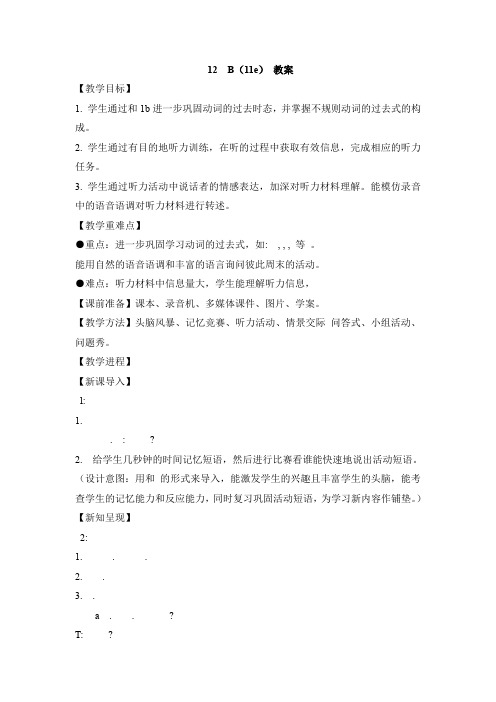
12 B(11e)教案【教学目标】1. 学生通过和1b进一步巩固动词的过去时态,并掌握不规则动词的过去式的构成。
2. 学生通过有目的地听力训练,在听的过程中获取有效信息,完成相应的听力任务。
3. 学生通过听力活动中说话者的情感表达,加深对听力材料理解。
能模仿录音中的语音语调对听力材料进行转述。
【教学重难点】●重点:进一步巩固学习动词的过去式,如: , , , 等。
能用自然的语音语调和丰富的语言询问彼此周末的活动。
●难点:听力材料中信息量大,学生能理解听力信息,【课前准备】课本、录音机、多媒体课件、图片、学案。
【教学方法】头脑风暴、记忆竞赛、听力活动、情景交际问答式、小组活动、问题秀。
【教学进程】【新课导入】l:1.. : ?2. 给学生几秒钟的时间记忆短语,然后进行比赛看谁能快速地说出活动短语。
(设计意图:用和的形式来导入,能激发学生的兴趣且丰富学生的头脑,能考查学生的记忆能力和反应能力,同时复习巩固活动短语,为学习新内容作铺垫。
)【新知呈现】2:1. . .2. .3. .a . . ?T: ?S: a .T: ?S: a( .)4. 1bT: ? a . . , a a .(设计意图:通过对每幅图片的描述,引导学生由使用旧知识过渡到自主使用新知识,达到了自然呈现的目的。
1b使用评价性的语言区分有趣和无趣的活动,通过练习学生能够完整地表达自己或他人的周末。
)【新知学习】3: 1c1. .( . T: . ? a . . , .): , ! .: . I . I .: ?: .: ?: , I a .: ? , ?: , . , I . ? ?: , I . , I a . , I .: ! !: , I . !(设计意图:教师导入听力语境,让学生明白听力要谈论话题是什么。
并且为1c的表格作铺垫,降低听力难度。
)2. .(学法指导:在听的过程中重点感受语气词的语音语调。
)3. . ? .(学法指导:由于此部分所填信息较多,播放第一遍听力时,教师可以引导学生先在旁边写重点词汇,播放第二遍听力时再核对信息,将信息转移到1c的表格中。
最新人教版新目标英语七年级下《Unit 12 What did you do last weekend全单元教学设计及教学反思》精品教案

8.备考____________
9.work as a guide____________
10.over____________
11.How interesting!____________
12.living habits____________
13.kind of________ 14.熬夜________
(Keys:1.do homework,2.go to the beach,3.去划船,4.play badminton,5.go t
o the cinema,6.在湖边野营,7.看望我的奶奶,8.study for the test,9.当导游,10.超
(最新精品教学设计)
Unit 12 What did you do last weekend?
第一课时 Section A(1a-2d)
Target Navigation 【目标导航】 Key words and phrases: camp,lake,beach,badminton,sheep,as,natural,butterfly,visitor,tired, stay,stay up late Key sentences: 1.—What did you do last weekend? —Well,on Saturday morning,I played badminton. 2.—Who visited her grandma? —Becky did. Skills:学会谈论过去事件。 Emotion:积极参与小组活动,大胆展示。 The guidance of learning methods 【学法指导】 1.通过多媒体课件展示图片,创设情境,让学生对用过去时描述事件有感观的认识。 2.通过同伴之间编写、演练对话来操练句型和巩固新单词。 3.通过听录音并记录所听到的信息来巩固单词和句型。 Learning important and difficult points【学习重难点】 1.进一步学习过去时态的用法。 2.继续学习谈论过去事件;学会用疑问词 who,what,when。 Teaching Steps 【教学过程】 Autonomous Learning Scheme 【自主学习方案】 预习指导与检测
2018年七年级英语下册Unit12WhatdidyoudolastweekendSectionB教案(新版)人教新目标版

Unit 12What did you do last weekend?Section B教学模式介绍探究式课堂教学模式的教学环节:创设情境——启发思考——自主(或小组)探究——协作交流——总结提高探究式教学模式是指在教学过程中,要求学生在教师指导下,通过以“自主、探究、合作”为特征的学习方式对当前教学内容中的主要知识点进行自主学习、深入探究并进行小组合作交流,从而较好地达到课程标准中关于认知目标与情感目标要求的一种教学模式。
同时侧重小组研究和小组活动,关注学生自主性。
设计思路说明【创设情境】教师通过让学生围绕上周做的活动这一话题进行讨论,复习所学知识,让学生做好听前准备。
【启发思考】教师通过热身练习和播放听力材料,让学生熟悉里面人物Sally和Jim的假期活动,并尝试使用Section A已学的内容正确获取信息。
【自主或小组探究】学生通过学习新的词汇crocodile, tiger, lizard, whale, lion, snake和预习2b 中Lisa的周末活动介绍,对后面所要学习的一般过去式时态做好准备。
此后,学生通过阅读文章内容,进行解题训练。
【协作交流】教师把将本要教授的知识点,用布置任务的形式,让学生通过与小组成员讨论的方式,自己先合作解决,比如two weeks ago, put up, wake up等的用法,通过任务型教学,让学生带着问题去解决,加深知识点的记忆和运用.【总结提高】教师通过引导学生总结回顾所学知识,写一篇有关自己上周周末所做的活动,让学生的阅读能力提升到写作能力。
教材分析本单元是本册教材的最后一个单元,以复习为主,一方面复习之前学过的很多动词短语,一方面通过以谈论上周末的活动为话题,继续巩固学习一般过去时态的应用。
Section B 继续谈过过去发生的事情,并使用评价性语言。
能理解一般过去时的阅读文章。
能够用一般过去时态描写自己的上周末。
教学目标【知识与能力目标】1. 复习一般过去时态的用法及动词的过去式。
新目标人教版英语七年级下册Unit 12 What did you do last weekend?单元过关试题及答案

Unit 12单元过关卷时间:100分钟满分:120分第Ⅰ卷听力部分(20分)Ⅰ. 关键词语选择(共5小题;每小题1分,满分5分)1. A. luck B. park C. lake2. A. tired B. afraid C. scared3. A. sheep B. snake C. sleep4. A. walk B. work C. wake5. A. stay up B. cut up C. put upⅡ. 短对话理解(共5小题;每小题1分,满分5分)6. What will they do?A B C7. What did Eric do last Saturday?A B C8. What did Jeff see by the river yesterday?A B C9. What is the boy doing?A B C10. How did Dale go to the cinema last weekend?A B CⅢ. 长对话理解(共5小题;每小题1分,满分5分)听下面一段对话,回答第11、12小题。
11. What is Peter doing now?A. Reading a storybook.B. Watching TV.C. Reading a newspaper.12. Where did Peter go last Monday?A. To the beach.B. To the library.C. To the bookstore.听下面一段对话,回答第13至15小题。
13. Where did Jack live in childhood?A. In the city.B. In the countryside.C. In the town.14. Who helped Jack with his studies?A. His uncle and aunt.B. His teachers.C. His parents.15. How many rooms did the house have?A. Five.B. Six.C. Seven. Ⅳ. 信息转换(共5小题;每小题1分,满分5分)第Ⅱ卷笔试部分(100分)Ⅴ. 单项填空(共10小题;每小题1分,满分10分)21. —My friends and I will go fishing today.—________A. My pleasure.B. Thanks a lot.C. Have a nice day!D. Nice to meet you.22. Robinson Crusoe made a fire ________ the meat.A. to cookB. cookC. cookingD. cooked23. —Our classmates are going to Fantawild Adventure(方特欢乐世界)after the exams.—________ exciting idea!A. WhatB. What anC. How anD. How24. —What do you think of English?—It's a useful ________, so we must learn it well.A. questionB. languageC. messageD. problem25. —Is ________ OK?—Yes, I get on well with my classmates and I like my school life.A. somethingB. anythingC. everythingD. nothing26. —Was your mother busy yesterday?—Yes, she was. She ________ the house all day.A. cleansB. is cleaningC. will cleanD. cleaned27. —What were the students doing when you came into the classroom?—I saw them ________ games.A. playB. to playC. playingD. played28. —How was your trip?—________. I had a good time camping in the forest.A. It was greatB. It was terribleC. That sounds greatD. Lucky you29. —Jenny, please come here and help me ________ the tent.—OK. I'm coming.A. put upB. cut upC. put onD. cut down30. —I was surprised to see you at the library so early in the morning.—________, huh?A. Every dog has its dayB. East or west, home is the bestC. Where there is a will, there is a wayD. The early bird catches the wormⅥ. 完形填空(共10小题;每小题1. 5分,满分15分)Hello! I'm in Sanya now. My parents and I arrived here ________(31)plane yesterday. My uncle met us at the airport (机场). We were a little ________(32), so we had a rest after we arrived at my uncle's home.Yesterday evening, we had dinner in a Chinese ________(33). The food was delicious there. After dinner, my cousin and I watched a(n) ________(34) soccer game on TV, because soccer is our favorite sport. When I ________(35) this morning, it was 7 o'clock. After breakfast, my family and I went to the beach. We swam in the sea and played volleyball on the beach________(36). We had a great time there. This afternoon, we ________(37) a walk along a busy street. There were many shops on both sides of the street. I loved this kind of street________(38) the shops sold all kinds of things at very good prices. I ________(39) some gifts for my friends.Now we're camping by a lake. My parents are putting up________(40). We will spend a good night here. How relaxing it will be!31. A. on B. for C. by D. with32. A. tired B. lucky C. happy D. scared33. A. bank B. restaurant C. library D. hospital34. A. lazy B. strict C. quiet D. exciting35. A. put up B. stayed up C. woke up D. got lost36. A. luckily B. early C. usually D. happily37. A. spent B. took C. kept D. crossed38. A. or B. so C. but D. because39. A. bought B. told C. showed D. left40. A. trees B. pictures C. tents D. clothesⅦ. 补全对话(共5小题;每小题1分,满分5分)A:Hello, Helen! What did you do last weekend?B: (41)________A: (42)________B:We played badminton.A:That sounds interesting. (43)________B:It was sunny.A:But it was rainy in my town.B: (44)________A:It was boring. I didn't want to do anything.B:Oh! (45)________ See you.A:Bye.A. How was the weather in your town?B. I have to go.C. I went there with my parents.D. What did you do?E. Who did you go there with?F. Well, I visited my friend.G. How was your weekend?Ⅷ. 阅读理解(共15小题;每小题3分,满分45分)AThis happened (发生) about two years ago. I went to an art festival in France with my friends. The festival would last (持续) five days.When we arrived, the weather was great. It was very hot and sunny, so we went to the mountains for camping. But in the mountains the weather changed (变化) quickly. That night there was a terrible storm. At first we didn't worry about it, but itinto the tent. In the end, we had to leave and take our things to a hotel. There weren't any free rooms, so they let us sleep in the dining room. The next morning, it was sunny again. But our tent wasn't there. The wind blew it away at night.46. Where did the writer go for the art festival?A. To China.B. To the UK.C. To the USA.D. To France.47. The underlined word “storm” means ________ in Chinese.A. 暴风雨B. 雨夹雪C. 冰雹D. 大雾48. Where did the writer sleep that night?A. At home.B. In a hotel.C. In the tent.D. At a friend's home.49. Which of the following is TRUE?A. The art festival was one week long.B. The writer didn't enjoy the camping.C. The writer couldn't find his bag the next morning.D. The bad weather in the mountains lasted two days.BHere are some of John's diaries(日记).50. What was the weather like on Saturday?A. Fine.B. Cloudy.C. Rainy.D. Snowy.51. What did John have for lunch on Sunday?A. Some rice and vegetables.B. Some hamburgers and bread.C. A bowl of noodles and some chicken.D. Two hamburgers and some vegetables.52. John stayed at the hotel on Sunday because ________.A. it rained that dayB. he didn't like to go outC. he liked watching TV thereD. he wanted to have a good sleep53. Which of the following is TRUE?A. It was windy and cool on Friday.B. John went to Tian'anmen Square himself.C. John thought teaching the children to swim was fun.D. John watched an interesting movie on Sunday evening.CDean could plant (种植) apple trees well. He often gave other people apples. One day, Dean gave John a young apple tree. He told John, “You can take it home and plant it, and then you can get many apples. ”John was very happy. But when he got home, he didn't know where to plant the young apple tree. He was afraid that if he planted the tree near the street, strangers (陌生人) would take the fruits; if he planted the tree near his house, his neighbors would take some of the apples; if he planted the tree in his garden, his children would take the fruits.At last, he planted the apple tree in his room, so others couldn't see it. But the tree died (死了) soon. John was very sad. He told Dean about it.“Yes,” said Dean, “Others can't enjoy the fruits if you plant the tree in your roo m.54. Why did Dean give John a young apple tree?A. Because they were good friends.B. Because he had many apple trees.C. Because he didn't want to give John apples any more.D. Because he wanted John to have many apples.55. Which of the following is TRUE?A. The young apple tree died at last.B. Dean never gave apples to others.C. Dean wasn't good at planting apple trees.D. John planted the apple tree with his children.56. From the passage, we know that ________.A. John is very cleverB. John is very friendly to othersC. John only thinks about himselfD. John likes to learn from his friends57. What's the best title of this passage?A. An apple treeB. John and his friendC. How to plant treesD. How to be a good fatherD阅读下面短文,并用英语回答问题(请注意每小题后面的词数要求)。
人教新目标版英语七下Unit 12《What did you do last weekend》(Se

人教新目标版英语七下Unit 12《What did you do last weekend》(Section A 1a-2d)教学设计一. 教材分析人教新目标版英语七下Unit 12《What did you do last weekend》主要讲述了人们在上个周末所做的事情。
本节课的主要语言目标是让学生能够熟练地运用一般过去时询问和回答别人上个周末的活动。
教材中包含了丰富的图片和情境,使得学生能够在真实的情境中学习和使用英语。
二. 学情分析学生在学习本节课之前,已经掌握了一般过去时的基本知识,同时他们对上个周末的活动有一定的了解。
然而,学生在运用一般过去时进行问答方面还存在一定的困难,因此,教师需要通过不同的教学活动来帮助学生巩固和提高这方面的能力。
三. 教学目标1.知识目标:学生能够掌握一般过去时的基本结构,并能够熟练地运用一般过去时进行问答。
2.能力目标:学生能够在真实的情境中,运用所学的语言知识进行有效的沟通和交流。
3.情感目标:通过学习本节课,学生能够培养对英语学习的兴趣,提高他们的自信心。
四. 教学重难点1.教学重点:学生能够熟练地运用一般过去时进行问答。
2.教学难点:学生能够灵活运用一般过去时描述自己的上个周末的活动。
五. 教学方法本节课采用任务型教学法、情境教学法和交际法进行教学。
教师通过设计各种任务和情境,让学生在真实的语言环境中学习和使用英语。
同时,教师还采用分组合作、角色扮演等教学手段,激发学生的学习兴趣,提高他们的参与度。
六. 教学准备1.教师准备:教师需要提前准备教材、教学课件、图片等教学资源。
2.学生准备:学生需要提前预习教材,了解一般过去时的基本知识。
七. 教学过程1.导入(5分钟)教师通过向学生提问:“What did you do last weekend?”来引出本节课的主题。
然后,教师可以让学生分享他们的上个周末的活动,从而激发学生的学习兴趣。
2.呈现(10分钟)教师通过展示教材中的图片和情境,让学生感知和理解一般过去时的基本结构。
新目标版英语七年级下册Unit12Whatdidyoudolastweekend?(SectionB)含答案
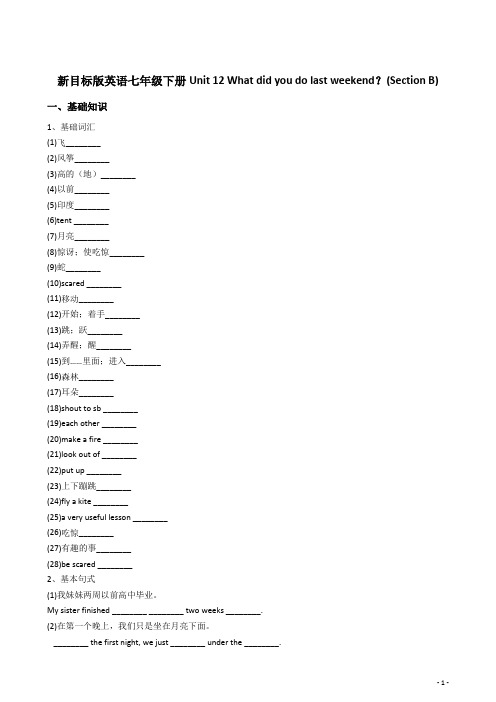
新目标版英语七年级下册Unit 12 What did you do last weekend?(Section B)一、基础知识1、基础词汇(1)飞________(2)风筝________(3)高的(地)________(4)以前________(5)印度________(6)tent ________(7)月亮________(8)惊讶;使吃惊________(9)蛇________(10)scared ________(11)移动________(12)开始;着手________(13)跳;跃________(14)弄醒;醒________(15)到……里面;进入________(16)森林________(17)耳朵________(18)shout to sb ________(19)each other ________(20)make a fire ________(21)look out of ________(22)put up ________(23)上下蹦跳________(24)fly a kite ________(25)a very useful lesson ________(26)吃惊________(27)有趣的事________(28)be scared ________2、基本句式(1)我妹妹两周以前高中毕业。
My sister finished ________ ________ two weeks ________.(2)在第一个晚上,我们只是坐在月亮下面。
________ the first night, we just ________ under the ________.(3)对我来说,这是一个非常有用的教训。
This was a very ________ lesson ________ me.(4)我爸爸开始在他们的帐篷里跳上跳下。
My dad started to ________ ________ ________ ________ ________ their ________.(5)我是如此累,以至于很早就去睡了。
人教新目标版七年级英语下册Unit12WhatdidyoudolastweekendPeriod2教案新版

重难点
重点:学会用动词短语表达 过去发生的事。
难点:熟练掌握本课所学语言目标。
教学方法
任务型教学法;小 组互动法 。
学习方法
合作学习法;小组检查法。
教学准备
多媒体课件
教学过程
设计意图
Step 1情景导入
Te acher:Do you know butterflies?My friend Lisa knows a lot about butterflies. After this lesson,we will know how she knows well about the butte rflies.
Step 2完成教材2a—2c的任务
1.大声朗读2a中的句子,弄懂每一句的意思,为听力做好准备。
2.认真听录音,在你听到的单词下面画横 线,集体核对答案,完成2a。
3.再听一遍录音根 据听到的信息,按要求完成2b, 集体核对答案。
4.听第三遍录音并跟读,模仿语音语调。
5.让学生两人一组,根据2a中的句子来用who,what和where进行提问和回答。
SectionA (2a-2d)
T:How was your last weekend?S:It was great.
T:What did you do last weeken d?S:I milked the cows.
教
后
反
思
6.小结训练。
一Who spent the weeke nd with you?
—MaryB .
A do B did C does D doing
Step 3完成教材2d的任务
1.学生自读对话,回答下面问题。
(1)How was Lisa’s weekend?
人教新目标版七年级英语下册Unit12Whatdidyoudolastweekend?优质教案
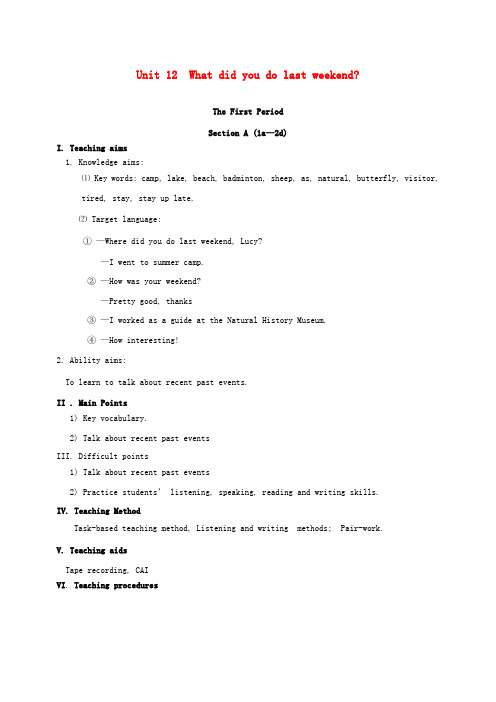
Unit 12 What did you do last weekend?The First PeriodSection A (1a—2d)I. Teaching aims1. Knowledge aims:⑴ Key words: camp, lake, beach, badminton, sheep, as, natural, butterfly, visitor,tired, stay, stay up late.⑵ Target language:①—Where did you do last weekend, Lucy?—I went to summer camp.② —How was your weekend?—Pretty good, thanks③ —I worked as a guide at the Natural History Museum.④ —How interesting!2. Ability aims:To learn to talk about recent past events.II . Main Points1) Key vocabulary.2) Talk about recent past eventsIII. Difficult points1) Talk about recent past events2) Practice students’ listening, speaking, reading and writing skills.IV. Teaching MethodTask-based teaching method, Listening and writing methods; Pair-work.V. Teaching aidsTape recording, CAIVI. Teaching proceduresReflections:The Second PeriodSection A (Grammar Focus – 3c )Ⅰ. Teaching aims1. Knowledge aims:⑴ Key words: away, mouse, baby, shout ,shout at, woof, language.⑵ Target language:—What did you do last weekend?—I did my homework.—Who visited her grandma?—Becky did.—Where did she go last weekend?—She went to a farm.—Who did she go with?—She went with her classmates.2. Ability aims:Talk about recent past events3. Emotion aims:To remember the key words and target language.II . Main Points1) Key vocabulary.2) Talk about recent past eventsIII. Difficult points1) Talk about recent past events2) Practice students’ listening, speaking, reading and writing skills. IV.Teaching MethodTask-based teaching method, PairworkV. Teaching aidsTape recording, some pictures.Reflections:The Third PeriodSection B ( 1a –1e )I. Teaching aims1. Knowledge aims:⑴ Key vocabulary: fly, kite, fly a kite.⑵ Target language:—Did you go anything interesting last weekend?—Not really, but I visited my sister.—My sister finished high school two weeks ago.2.Ability aims:To improve students’ listening, speaking, reading and writing abilitie s.3. Emotion aims: Learn to communicate with others .II. Main Points1) Key vocabulary.2) Talk about recent past events.III. Difficult points1) Talk about recent past events2) Practice students’ listening, speaking, reading and writing skills. IV. Teaching MethodTask-based teaching methodV. Teaching aidsTape recording, CAIVI. Teaching proceduresReflections:The Fourth PeriodSection B (2a – self check )Ⅰ. Teaching aims1. Knowledge aims:(1).Keywords: moon, jump, wake, forest, ear, sing-sang, study –studied, have –had, go-went, fly- flew, swim-swam, put up, get a surprise, shout to, up and down, wake...up,high school,⑵ Target language:---Did you go anything interesting last weekend?---Not really, but I visited my sister.---My sister finished high school two weeks ago.2. Ability aims: Train students’ reading and writing skills.3. Emotion aims: Help students learn from each other and work together .II. Main PointsTo learn to talk about weekend activities using simple past tense.III. Difficult pointsUse the simple past tense to write a passage.IV. Teaching MethodTask-based teaching methodV. Teaching aidsTape recording, pictures.Reflections:。
人教新目标版七年级英语下册Unit12Whatdidyoudolastweekend(第5课时)教学设计

A: How was the weekend?
B: It was fun an d relaxing.
2
仿照上述 对话,组织Pair-work复习活动
T: OK. Let’s do pair-work: Talk about your last weekend.
15
组织Pair-work,巩固动词的一般过去时态和what, how, where引导的特殊疑问句
1.引导学生读懂任务要求,学生独立完成 。
2.学生两人一组采取对话形式交流、检查答案,体会特殊疑问句
的用法。
3.请三组学生分别朗读对话。
4.引导学生观察对话,总结how, where引导的特殊疑问句的
What did you do last weekend
Unit 12
What did you do last weekend?
Period 5
Content Section B 3a, 3b, Self Check
教学目标要求
1.能够使用提供的信息(图片,短文),通过补全短文完成控制性写作练习。
2.能够使用所学的目标句型完成陈述自己周末活动的写作练习。
8
组织小组讨论,总结陈述周末活动的文章的写作要素
1 .引导学生观察语言结构。
2.小组讨论,总结写作要点。
3.教师帮助,列出写作要点,提醒学生:描述过去的周末活动时
注意按时间顺序以及用过去时态。
9
罗列周末活动及时间,为3b的写作练习做必要的铺垫
1.学生按时间顺序罗列出自己的周末活动。
2.学生两人一组相互交流,检查表示活动的动词的过去式。
新人教 英语 七年级下册Unit12 What did you do last weekend知识点详解

Unit12 What did you do last weekend?知识点详解单元目标总览:【知识点详解】1、camped by the lake在湖边扎营(1)①camp 作动词,意为“扎营,搭帐篷”。
◆We go camping every summer. 我们每年夏天都去野营。
◆We walked all day and camped by a river at night.我们走了一天,晚上在一条河边宿营。
②camp 作名词,意为“露营地,度假营”。
◆Let’s go back to the camp, it’s getting dark. 让我们回营地吧,天黑下来了。
◆We spent two weeks at camp this summer. 我们今年夏天在度假营玩了两周。
(2)by介词, 意为“在……旁边”,表示位置,相当于beside。
◆Our teacher is sitting by the window. 我们老师坐在窗户旁边。
拓展:by作介词的其他常见用法:(1)表示移动方向,意为“经过”。
◆My mother goes by the building every day. 我妈妈每天从这栋楼旁边经过。
(2)表示方式及手段,意为“用,靠,通过”。
◆He makes a living by fishing. 他以捕鱼为生。
(3)与交通工具名词连用时,名词前不用冠词,意为“乘、坐、用”等。
◆I went there by bike. 我骑自行车去那儿的。
6. tired2、What did you do last weekend?上周末你做什么?What+did+主语+谓语动词原形+其他,这一特殊疑问句用来询问某人在过去某个时间或地点做过什么事情,其中did为助动词,没有人称和数的变化,谓语动词为实义动词原形。
◆—What did you do last night?昨晚你做了什么?—I visited my uncle.我看望了我的叔叔。
2018年人教新目标英语七下unit 12 《What did you do last weekend》课件

Saturday ___________night
afternoon Sunday___________
Sunday ___________morning
Lucy’s weekend
morning Saturday ___________
Saturday afternoon ___________night Saturday___________
What did he do?
He went boating.
What did he do?
He played badminton.
What did they do?
They went to the beach.
11
went boating
2
3
went to the cinema
went to the beach
have a party stay at home take a shower watch TV read newspapers clean the room study for a test practice English visit grandparents
What did he do last weekend?
2c Student A asks questions with who, what or where and Student B answers.
Then change roles.
Carol
studied for the
test
Jack
farm
Becky
her
went to a visited
fed some sheep / cows
